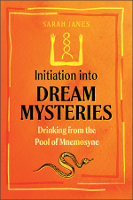I think dreams are in danger, and if dreams are in peril, then so too is our health, on an individual and a collective level. When we surrender our consciousness to technology, to more and more inane, mindless, disengaging distractions, we lose our powers of memory. Digital dementia is a very real problem, one that is shown to impact cognitive abilities, to blunt memory, and to wither our emotional-processing faculties.
Our subtle dream worlds are easily swathed in brain fog. If we wake up in the morning and habitually reach for our devices, this inevitably entrains us to the idea that they are the thing we have to do, to look at, that their world is the place where we need to mentally be. We are expanding and projecting an image of ourself into an imaginal space. The digital home does not really exist, so our attempts to live in it are bound to cause disassociation and anxiety. There is no axis mundi that anchors us to the internet.
On a more pragmatic note, we are also simply going to bed later and later, as artificial lights reconfigure their luminous projection routes through our brains and eyes. In many instances we are not getting even the bare minimum of sleep that’s necessary for ordinary, healthy biological functioning.
Through our devices, even the physical way we look at the world has changed. A new mode of seeing, determined in many cases by the habitual use of social media and screens, significantly affects the way we process stress, anxiety, and trauma in our waking life as well as in our dreams.
Our predominate daily eye movements have shifted from left-to-right movements that scan the depth of field of a natural, real-life environment, to close-range, rapid, up-and-down movements associated with looking at a screen and scrolling on handheld devices. Such eye movements are known to actively encourage and promote anxiety and panic. A technique known as Eye Movement Desensitization and Reprocessing (EMDR) is an effective trauma therapy that provides evidence for how eye movements influence emotional memory processing.
We are now a culture unhealthily addicted to technology, to artificial light and constant communication. That some children begin to feel sick and anxious when they have their phones taken away; that people are reading, loving, moving, drawing, singing, and dancing less; that most of our contact with other people is through a keypad or box on a screen is enormously devastating.
Cultivating a Culture of Dreaming
If we wish to preserve our dreams, we need to completely invest in a lifestyle and philosophy that is conducive to producing wonderful dreams. We need to cultivate a culture of dreaming that celebrates this very special and personal part of being human.
Conscious dreaming is part of a spiritual reality. It can be a tool for the psyche to integrate experience, a methodology to become the best version of ourselves that we can be. In our dreams we might see an exaggeratedly excellent or extremely pathetic version of ourselves. Sometimes we see our worst qualities highlighted, or the deluded, wishful thinking of an inflated ego.
Dreaming is most useful when it presents us to ourselves as we truly are. And we can know we are emotionally evolving when we see that true and honest version of ourselves becoming thoroughly loveable.
We should learn more about the wisdom of ancient dream sanctuaries. Dreaming should be incorporated into modern therapeutic treatments, and sleep hygiene should be of extra importance in hospitals and treatment centers. Much in the same way psychedelics have their place in integrative therapy, so too does dreaming. Dreaming is also a practice that can done at home and continued for the rest of your life, without any cost, detrimental consequences, or risks of dependence.
Nightmares...
Many people have nightmares because they are not honest with themselves and/or other people when they are awake. In such cases, dreams bubble up from the unconscious, because that is where the true nature of a person lies. When the ego releases control in sleep, the unconscious rises to the surface and manifests as nightmares, violent dreams, shame, anxiety, and guilt.
If people have unpleasant dreams or night terrors, they often choose to suppress them by using alcohol, cannabis, or prescription medications. Antidepressants are well known for reducing the duration and quality of REM sleep cycles. But if we do not face our dreams, we can end up stuck in a psychological rut, as we are not processing or integrating our experiences and trauma. We must face and integrate the shadows lurking in our dreams if we want to grow.
Lucid Dreaming...
For me, a lucid dream is simply a dream in which I remember who and where I am. In this process of remembering I am often able to control my environment or manifest people, places, and things. But control is really the lesser part of the experience. The best is the feeling of ecstasy and delight that comes with being utterly present, aware, and free in a uniquely creative and imaginal realm.
In a lucid dream experience, the richness and clarity of any given dream scene can feel overwhelming. This is often why people end up jolting themselves out of sleep, and why so many lucid dreamers begin their journey as children, having very real-feeling nightmares. The intensity of this realness is exciting and enlivening, and it seems to signal powerfully to the self-aware aspect of ourselves.
Optimal Sleep Hygiene Practices
Sleep hygiene is a vital dream technology that cannot be underestimated. I have sleep and dream rituals that I practice every night that help me relax. I think it is deeply important to approach sleeping and dreaming with reverence. We should mentally elevate it as a therapeutic health treatment, a deeply creative, expressive art form, an expression of a working relationship with the universe and a spiritual and prophetic practice.
-
Try to sleep for a minimum of eight hours a night. When it comes to dream memory and recall, at least eight hours is necessary for most people, although everyone has a unique circadian rhythm fingerprint.
-
When you fall asleep, the first sleep cycles are the shortest. Your body’s priority here is non-REM sleep for cellular regeneration and detoxification. As your sleep progresses, your sleep cycles become longer, with maximum opportunities for lucid dreaming in the longest REM cycles just before awakening in the morning.
-
It’s easier to get eight hours a night if you minimize caffeine and establish a regular bedtime that is no later than 11:00 p.m.
-
Turn off devices and screens by 7:00 or 8:00 p.m. Use blue light filters to minimize sensitivity and overstimulation during the day.
-
Do not eat a heavy meal before going to sleep. Fasting is excellent for dreaming.
-
Avoid alcohol. As a depressant, its lingering, dampening effects can take months to wear off completely.
-
Keep your bedroom dark and silent. Create a sleep temple in your own home and make your bedroom a sacred space. Try to restrict your bedroom activities to sleeping and intimacy only.
-
Bathe before sleeping. This helps to lower your core body temperature, which is good for sound and restful sleep. Often our sleep is disturbed by spikes in temperature, and this can feed into distressing dream content and disturb us further. Epsom salts in the bath can be very helpful for promoting restful sleep.
-
Bedding and a mattress made of natural materials are best. Synthetic fibers and memory foam mattresses can make us feel hot and uncomfortable. Their lack of breathability is unhealthy for the skin and nervous system. When we’re hot, we will often have distressing or anxious dreams, as our inner dream vision attempts to create a narrative from the sensory landscape of our body.
-
Cannabis and antidepressants can suppress REM sleep. Be mindful of this and have afternoon naps, meditate, or try sleep hypnosis sessions if possible to encourage dreaming.
-
Do not watch horror movies! It sounds obvious, but if you watch, read, or think about scary, gory, or horrifying events, you will very likely incorporate these visual elements into your dreams and have nightmares. In general, think about what media and visual input you consume. Think about it the same way you would think about the food you should eat if you want to be healthy.
-
If you have a nightmare or come across a scary presence in the sleep state, remember that your dream characters are powered by your feelings and thoughts. Do not fight a dream character. This will just exhaust you and give them more power. Neutralize the negative feelings in your dream body and try to project a feeling of love onto this shadow. You might experience an amazing alchemical transformation, and the scary character might morph into a perfectly loving being. It may evaporate, transmute into something more positive, or it might be absorbed by your dreaming avatar.
-
In dreams, try eating and drinking. Often a dream food or drink can act as an agent of transformation, as depicted in Alice in Wonderland. It’s even possible to experience dream inebriation, a dream catalyst that can be helpful sometimes.
-
Any activity or supplement that improves your memory will likely improve your chances of attaining dream lucidity, as becoming lucid in a dream is really remembering who and where you are.
-
If you wake up and haven’t had a lucid dream, just try going back to sleep until you do.
-
Play word and memory games. I have found Scrabble to be especially good. The configuration of words from random letters works similarly to the dreaming mind’s way of language-processing and word identification.
-
Read novels and write stories, especially magical realism. Research has shown that when we read novels and immerse ourselves in reading fiction, our neural pathways are altered as a result of us imagining ourselves somewhere else.
-
Think about your past dreams, read old dream journal entries, or map out the world of your dreams. Draw a map of your desired imaginal realm or embellish an existing one. Imagine and fantasize. Imagining is a dream workout!
-
Cultivate a crush on someone. Having a crush or a deeply romantic attraction is great for dreaming. Our wish-fulfilling dream minds want to bring us the object of our affection.
-
Go on holiday or get a holiday mind-set. When we are on holiday, time seems to pass more slowly. We often experience a slightly altered state of consciousness as we drink in new and novel surroundings. I call this exotic consciousness. Try to encourage this exotic way of seeing things in your everyday life.
-
Write down your dreams as soon as you have them. Take note of the words—there is often a lot of punning and wordplay in dreams. Analyze them, think about what message they are trying to communicate. Recording dreams is a dynamic process that strengthens future dream experiences and memories. The act of writing down a dream remembers it to conscious memory and strengthens the architectural structures of our inner memory palace.
-
Try sleep hypnosis for an afternoon nap or when falling asleep at night. Sleep hypnosis constitutes a sort of curated sleep experience, where you can surrender to the voice of the guide and allow them to take you on a guided sleep journey. It can especially useful if you are suffering from anxiety or insomnia to practice during the day as there is less pressure and worry about falling asleep. Always make a point to record your imaginal impressions and experiences however transient or vague.
-
Use scent to tap into the interconnectedness of the olfactory and memory brain regions. I have experimented using certain scents to evoke particular memories in dreams. For example the smell of freshly cut grass might remind you of being a child during summer holidays so if you take a nap in a freshly mown meadow, you might find yourself dreaming of your childhood. Certain essential oils are known to have a calming effect on the nervous system, vervain, frankincense, and cardamom I find to be especially soothing, but a lot of this is down to personal taste.
Dreams have played an absolutely vital part in the development of human culture and even the evolution of human perception and consciousness. I encourage you to explore the dream state personally and ask philosophical questions about what the dream can reveal about the rest of your life.
Copyright ©2022. All Rights Reserved.
Adapted with permission of the publisher,
Destiny Books, an imprint of Inner Traditions Intl.
Article Source:
Initiation into Dream Mysteries: Drinking from the Pool of Mnemosyne
by Sarah Janes Sharing her more than a decade of research on Sleep Temples and Mystery Schools of the Esoteric Tradition, lucid-dreaming instructor Sarah Janes explores the evolution of imagination, memory, and consciousness throughout the ages and proposes that dreams have been fundamental in the creation and development of culture.
Sharing her more than a decade of research on Sleep Temples and Mystery Schools of the Esoteric Tradition, lucid-dreaming instructor Sarah Janes explores the evolution of imagination, memory, and consciousness throughout the ages and proposes that dreams have been fundamental in the creation and development of culture.
Explaining how a conscious dream life is essential for self-discovery, deep integration, and healing, Sarah presents exercises, techniques, initiations, and seven guided audio meditations to help you explore the inner depths of your psyche. Sarah reveals how dreams offer us an opportunity to remember and directly experience our divinity, to transcend the limitations of our mortality and enter timeless imaginal realms. These realms, accessible through dreams, can help you to form a better understanding of who you are.
Click here for more info and/or to order this paperback book. Also available as an Audiobook and as a Kindle edition.
About the Author
 Sarah Janes has been an enthusiastic lucid dreamer since childhood. She is a writer, public speaker, and sleep hypnosis workshop facilitator. She runs Explorers Egyptology, an online lecture series, and with Carl Hayden Smith operates the Seventh Ray, a mixed reality Mystery School. She is also producer and co-host for the Anthony Peake Consciousness Hour podcast.
Sarah Janes has been an enthusiastic lucid dreamer since childhood. She is a writer, public speaker, and sleep hypnosis workshop facilitator. She runs Explorers Egyptology, an online lecture series, and with Carl Hayden Smith operates the Seventh Ray, a mixed reality Mystery School. She is also producer and co-host for the Anthony Peake Consciousness Hour podcast.
Sarah is currently working with Dr. Mervat Nasser at New Hermopolis in Egypt and with Rupert Sheldrake and the British Pilgrimage Trust to reinvigorate the practice of dream incubation at sacred sites. She lives in Hastings, England.
Visit her Website at TheMysteries.org/

























